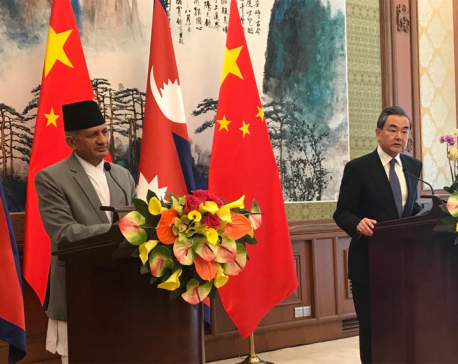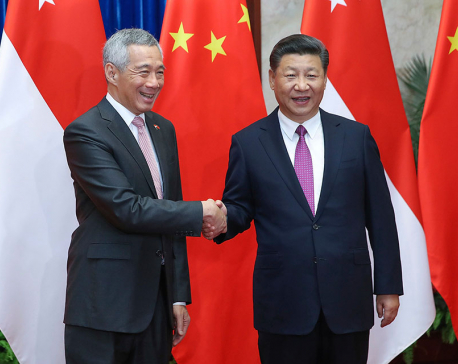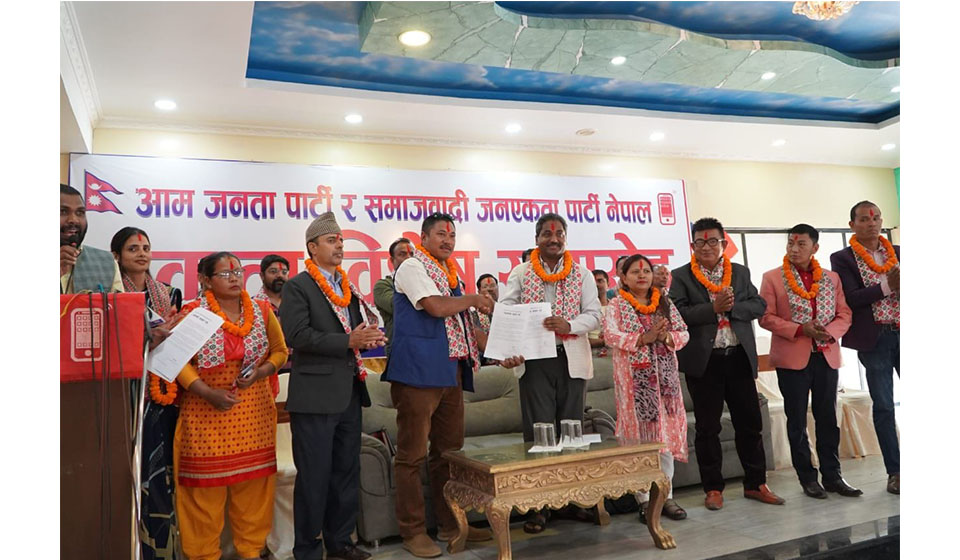
OR
Chinese envoy's statements on Nepal-India trade relations ignite controversy
Published On: September 6, 2023 10:02 PM NPT By: Republica | @RepublicaNepal

KATHMANDU, Sept 6: Recent remarks made by the Chinese envoy to Nepal regarding Nepal-India relations, including bilateral power trade, have sparked controversy in Nepal, with political leaders and foreign policy experts describing them as interference in Nepal’s internal affairs.
While addressing a program in the capital on Saturday, Ambassador Chen Song argued that India's policies toward Nepal were often less than friendly and not entirely beneficial to Nepal. He also suggested Nepal to ensure economic restructuring in line with the Chinese economic structures, with a focus on the agriculture sector.
While his suggestions to develop internal capacity and prioritize the agriculture sector have been received positively, the envoy’s remarks about Nepal's relations with India, in particular, have not been well-received in Nepal. A section of political party leaders and foreign policy experts have described them as unwarranted, undiplomatic, and uncalled for.
Addressing a discussion entitled “China in the global economy and its impact on Nepal,” organized by the Foundation for Trans-Himalayan Research and Studies and Friends of Silk Road Club Nepal, Ambassador Chen recognized India’s vast market potential but advised Nepal to navigate its relationship with India cautiously, given certain policy constraints.
"When Nepal develops its own economic policies, you have to take that into consideration. Unfortunately, you have a neighbor like India, but fortunately, you have a neighbor like India because India is a huge market with huge potential that you can tap into. But at the same time, India’s policy towards Nepal and other neighbors is not so friendly and not so beneficial to Nepal. So, we call those policy constraints," he said.
The envoy initiated the discussion by addressing Nepal’s electricity trade deficit, pointing out that while Nepal exported electricity worth Rs 10 billion to India in the last fiscal year, it imported electricity worth Rs 19 billion from India, highlighting a substantial imbalance in electricity trade. He also noted that Nepal imported cereals worth Rs 7 billion from India within the first month of the current fiscal year, underscoring Nepal’s heavy reliance on agricultural imports from its neighboring country.
Joint General Secretary of the ruling Nepali Congress (NC), Mahendra Yadav, criticized the Chinese envoy's remarks about Nepal’s trade relations with India as undiplomatic and uncalled for. "Whatever the Chinese ambassador has said regarding Nepal's relations with India has caused a stir in Nepal. This goes against diplomatic norms. Nepal is a sovereign country, and it's purely our internal matter to decide our friends and business partners," he said.
"We also have friendly relations with China. The Chinese ambassador is here to strengthen the relationship between the two countries. However, no one has given him the right to harm Nepal's relations with other countries. What he has said is an attack on Nepal's sovereignty. He has humiliated the Nepalese,” he argued.
Leader Yadav went further to accuse the Chinese envoy of creating confusion in the relations between Nepal and India. “I request the ambassador to stop this immediately and not engage in such actions,” he said, adding that the Nepal government should seek an explanation about Ambassador Chen’s statement.
Rastriya Prajatantra Party (RPP) General Secretary and Member of Parliament (MP), Dhawal Shamsher Rana, also objected to the statement of the Chinese ambassador to Nepal. He said, “An ambassador should not make negative comments about another country in view of diplomatic norms, values, and dignity,” he said.
Echoing Yadav and Rana, Former ambassador Vijaya Kant Karna claimed that China’s undiplomatic activities in Nepal have increased since Chinese President Xi Jinping's visit to Nepal. "The State of Nepal, the Government of Nepal, and the Nepali parties are capable of conducting Nepal's foreign policy,” he said. “We have not given anyone the right to criticize the way we operate,” he said. “What the Chinese ambassador has spoken is unwarranted, undiplomatic, and totally uncalled for. Why did he say that? I have not been able to understand.”
While acknowledging concerns within Nepal about the growing trade deficit, Ambassador Chen during the program had expressed China’s willingness to support Nepalese exports, provided Nepal improves its capacity to produce high-quality agricultural and industrial goods. He also pledged to continue working toward Nepal’s benefit, acknowledging that his perspectives may evolve as he continues to explore potential cooperation between China and Nepal during his tenure in Nepal.
You May Like This

In China, foreign minister Gyawali dreams to travel in China by modern train
BEIJING, April 18: Nepal is a natural area for cooperation between China and India, the Chinese government’s top diplomat State... Read More...

China protests US Navy sailing near South China Sea claims
BEIJING, Oct 11: China is protesting the sailing of a U.S. Navy ship near its territorial claims in the South China... Read More...




Just In
- Sunkoshi-Marin Diversion Project’s tunnel construction nears completion, breakthrough scheduled for May 8
- Govt tightens security arrangement for Third Investment Summit 2024
- Pesticide residue found in vegetables in Nepalgunj
- Aam Janata Party and Samajwadi Jana Ekata Party merge
- 1,600 participants confirmed for Nepal Investment Summit
- Ilam-2 by-elections held peacefully, vote count likely to start tonight
- NEA schedules five-day power cut across Kathmandu Valley for underground cable installation
- Hundreds of passengers including foreign tourists in distress as poor visibility halts flights to and from PRIA







-1200x560-wm_20240427144118.jpg)





Leave A Comment